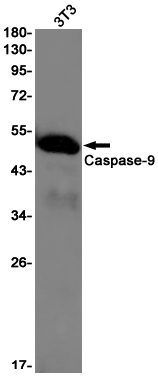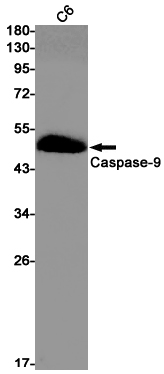

| WB | 咨询技术 | Mouse,Rat |
| IF | 1/20 | Mouse,Rat |
| IHC | 咨询技术 | Mouse,Rat |
| ICC | 技术咨询 | Mouse,Rat |
| FCM | 咨询技术 | Mouse,Rat |
| Elisa | 咨询技术 | Mouse,Rat |
| Aliases | CASP 9; Caspase-9; CASP-9; Apoptotic protease Mch-6; Apoptotic protease-activating factor 3; APAF-3; ICE-like apoptotic protease 6; ICE-LAP6; Caspase-9 subunit p35; Caspase-9 subunit p10; CASP9; MCH6 |
| Entrez GeneID | 12371 |
| WB Predicted band size | Calculated MW: 50 kDa; Observed MW: 50 kDa |
| Host/Isotype | Rabbit IgG |
| Antibody Type | Primary antibody |
| Storage | Store at 4°C short term. Aliquot and store at -20°C long term. Avoid freeze/thaw cycles. |
| Species Reactivity | Mouse,Rat |
| Immunogen | Recombinant protein of mouse Caspase-9 |
| Formulation | Purified antibody in TBS with 0.05% sodium azide,0.05%BSA and 50% glycerol. |
+ +
以下是3篇关于Caspase 9抗体的经典文献及其摘要概括:
1. **"Caspase-9 and APAF-1 form an active holoenzyme"**
- **作者**: Salvesen GS, Dixit VM
- **摘要**: 揭示了Caspase-9与APAF-1结合形成凋亡体的机制,研究利用Caspase-9抗体验证其在细胞色素c依赖性激活中的作用,确认其在凋亡信号传导中的核心地位。
2. **"An APAF-1·Cytochrome c Multimeric Complex is a Functional Apoptosome that Activates Procaspase-9"**
- **作者**: Zou H, et al.
- **摘要**: 通过免疫沉淀实验(使用Caspase-9抗体),证明APAF-1与细胞色素c结合形成凋亡体,直接激活Caspase-9前体,阐明了线粒体凋亡途径的关键步骤。
3. **"Structural basis for the activation of human procaspase-9"**
- **作者**: Riedl SJ, et al.
- **摘要**: 利用Caspase-9抗体进行结构生物学研究,解析了Caspase-9前体的三维结构,揭示其通过二聚化而非蛋白酶切割的独特激活机制。
4. **"Regulation of the Apaf-1–Caspase-9 apoptosome"**
- **作者**: Shiozaki EN, et al.
- **摘要**: 通过Western blot和免疫共沉淀(使用Caspase-9抗体),探讨了ATP结合及磷酸化修饰对Apaf-1-Caspase-9复合体活性的调控,强调其在凋亡中的动态平衡作用。
这些文献均涉及Caspase-9抗体的实验应用(如蛋白检测、复合体分析),并聚焦于其结构、功能及调控机制。如需具体期刊信息或年份,可进一步补充。
Caspase-9 is a critical enzyme in the apoptotic pathway, belonging to the cysteine-aspartic protease (caspase) family. It plays a central role in the intrinsic (mitochondrial) apoptosis pathway. Upon cellular stress signals, such as DNA damage or growth factor deprivation, cytochrome c released from mitochondria binds to Apaf-1. forming the apoptosome. This complex activates procaspase-9. which then cleaves and activates downstream effector caspases (e.g., caspase-3 and -7), leading to programmed cell death.
Caspase-9 antibodies are essential tools for detecting the presence, activation, or expression levels of caspase-9 in research. They can distinguish between the inactive zymogen (procaspase-9. ~46 kDa) and its active cleaved forms (p35/p37 fragments) via techniques like Western blotting, immunohistochemistry, or flow cytometry. These antibodies are widely used in studies of cancer, neurodegenerative diseases, and developmental biology to evaluate apoptosis regulation. Researchers also utilize them to assess the efficacy of pro-apoptotic drugs or to investigate mechanisms of apoptotic resistance in diseases.
When selecting a caspase-9 antibody, specificity is crucial, as cross-reactivity with other caspases or isoforms may occur. Antibodies targeting specific cleavage sites or post-translational modifications (e.g., phosphorylation) help elucidate caspase-9’s regulatory mechanisms. Commercial antibodies are typically validated in human, mouse, or rat samples, but species reactivity should always be confirmed experimentally.
×